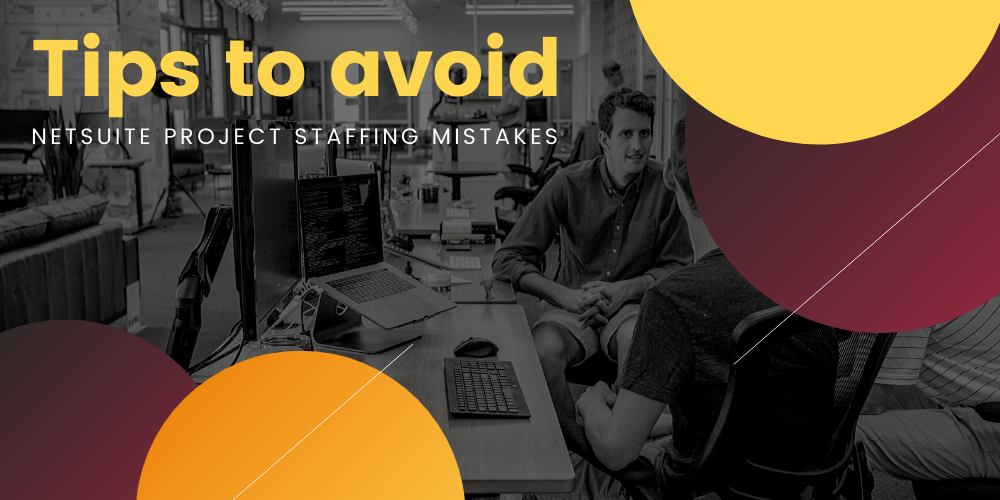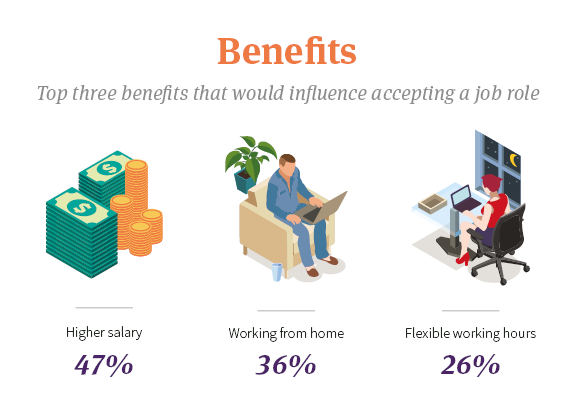
Many businesses are now looking to integrate their CRM, ERP, financial management and other critical business processes in the cloud to optimize operations and make data management simpler.
NetSuite is a great software for this, but it doesn’t come without challenges.
You may have heard the Gartner statistic floating around that there’s a 50-75% failure rate for ERP implementation. Get it wrong and it can be costly. But get it right with best practices, and your business can thrive.
We’ve already covered how to avoid the pitfalls of NetSuite implementation—but what about staffing? Most organizations don’t have the capacity or expertise to handle the complexities and workload of a NetSuite implementation and will need to expand IT teams both in the short and long term.
Businesses need a dedicated team to manage NetSuite effectively. However, IT projects are notoriously difficult to recruit for. In fact, a recent study found that more than half of IT leaders struggle to get staff with the right skills for the job. Another survey of hiring managers in tech discovered that 69% of hiring managers agree with the statement ‘it is difficult for great companies to hire talented tech workers’.
The tech skills gap is especially prevalent in the ERP industry; there’s a real shortage of talent for NetSuite, so making sure you’re on the right track when hiring for your project is crucial. So whether you’re considering an implementation, or you’ve already decided to go ahead, here are our top tips to avoid NetSuite project staffing mistakes during rollout:
Having concerns over your NetSuite team?
Have a chat with our NetSuite staffing specialist to see how they can improve your project.
1. Hire experienced NetSuite people, and put your best existing staff on the project
Your system is only as good as the people who operate and administer it, and you need to ensure you’re giving the project the bandwidth it needs. Businesses adopting NetSuite will need both functional and technical staff.
When it comes to people already in the company, make sure you put your best foot forward. David Ogilvie, an expert in maximizing ERP investments, says:
“Assign people from the organization that are the very best you have for the project. All too often those with the best knowledge and skill are in high demand for business-as-usual activities and there is a belief they cannot be spared.
“This results in those who do not perform well being hidden in a project rather than businesses taking more appropriate HR actions. An ERP project should have the most highly skilled, knowledgeable people from the company assigned to it.”
For additional staffing needs, it might be tempting to hire a generalized ERP/CRM professional, but this is a mistake. It’s best to go with professionals who have expert NetSuite knowledge. Remember to think about maintenance too, because the work doesn’t just end after the project is finished; running NetSuite requires constant attention. Here are some key roles you’ll need to hire for:
- Project Manager. Project Managers handle core operations on the platform and plan actions depending on business requirements. They will assign and organize a timeline, and outline different positions you’ll need.
- Administrator. Some companies end up with an ‘accidental admin’ who is already on the team, but it’s crucial to get somebody who is dedicated and trained in NetSuite to take on the role of administrator. Admins generally report to Project Managers and work with various departments to manage changes to fields, create custom workflows, dashboards, and do hands-on reporting. They will also train stakeholders on the system to ensure quick user adoption.
- Developer. Developers are responsible for creating a custom script using SuiteScript, and creating/testing back-end processes to automate key business functions. They usually work closely with the Administrator who will test things out on the front-end of the system.
Depending on the size and needs of your business, you may need additional roles, but these are the key people you need to think about when staffing your NetSuite project.
2. Don’t focus too much on certificates and specific knowledge
Over 41 percent of NetSuite professionals hold certifications. But, while it’s important to get experienced NetSuite staff on board, and certifications are impressive, they aren’t the be-all and end-all.
As the rate of NetSuite adoption grows and more businesses seek top talent, the pool of NetSuite candidates shrinks, meaning it’s more competitive than ever. Due to this NetSuite knowledge gap, you don’t want to narrow your focus too much and miss out on potentially great candidates, just because they don’t hold a certain certification.
In addition to this, IT skills don’t have a huge lifespan and will need to be updated over time anyway. According to Deloitte:
- Communication and collaboration skills last 50 years or more
- Platform-specific skills only have a lifespan of 2-10 years
- Skills like programming, project management, testing, and modeling last 15-20 years
The landscape is changing constantly, so the smartest way to manage long-term needs is to focus on candidates who have versatile competencies and can adapt over time. You want staff who are committed to keeping up-to-date and engaging in courses.
3. Hire quickly
You may need to hire a mixture of contract and permanent staff for your NetSuite project. Either way, because of the shortage of skills, businesses don’t want to be dragging out the process too much. Clients tell us that one of their bugbears is how long it takes to hire somebody. According to GlassDoor, the longest timeframes in the US are as follows:
- Washington, D.C. Average of 34.4 days
- Portland. Average of 25.3 days
- Seattle. Average of 25.0 days
- San Jose. Average of 24.8 days
- San Francisco. Average of 23.7 days
The areas with the shortest times are:
- Miami. Average of 18.6 days
- Phoenix. Average of 19.1 days
- Orlando. Average of 19.3 days
- Tampa. Average of 20.2 days
Even the shortest timeframe of 18.6 days is a while for candidates to be waiting, when two-thirds of IT candidates say they would lose interest in a position if there was no follow-up within two weeks. If you need NetSuite professionals fast, we can find you an employee in 24 hours for contractor roles, and 48 hours for permanent roles.
4. Look for talent in the right places
The cost of a bad hire can be at least 30% of the candidate’s annual salary. One thing that can greatly reduce the risk of a poor fit is making sure you’re looking in the right places to find the skills you need. While websites like Indeed.com often have a wide pool of talent, these aren’t always the best places to look for IT candidates. If you really want top NetSuite talent, try social media platforms like LinkedIn or specialist IT recruitment agencies.
Discover your next NetSuite hire with our candidate search
5. Give genuine benefits and pay your staff well
Once you’ve got your perfect hire, you still need to make efforts to retain them. Talented NetSuite professionals will remain in demand. Elena Tinios, manager at Anderson Frank, points out:
“Today, it’s a candidate-driven market. There are far more NetSuite jobs available than there are great candidates. Because of this, there’s been an increase in perceived ‘job hopping’ due to the good candidates continuously being presented with new opportunities. So in order to retain staff, businesses cannot neglect the need for genuine benefits and perks for employees.”
In our 2019 NetSuite salary survey, we found that the top three benefits influencing job role satisfaction were:

And the top three reasons for switching jobs were:
- Lack of salary/earnings increase (46%)
Pay is not always the most important aspect of job satisfaction; people actually need much more in genuine benefits to be truly happy at work. However, without a clear pathway to pay increase, there’s no incentive for employees to plan or envision their future at a certain company. This can leave people stagnant and disengaged.
- Lack of career or promotional prospects (40%)
If there’s no obvious sign of progression then people will begin to feel undervalued very quickly. Not everybody will get a promotion handed to them on a plate – it takes hard work, of course – but without a vision on the horizon and something to aspire towards, people will lack the motivation to work hard enough to be promoted in the first place.
- Lack of leadership/vision ( 27%)
A clear vision for the company is often only discussed at C-level, but this is a mistake. For a leadership team to be effective, they need to ensure they communicate the company’s vision and goals across the entire organization. Without this, people will feel directionless and may begin to lack faith in the company.
It’s important for businesses to pay close attention to these issues to avoid the risk of losing staff.
6. Focus on employee buy-in, training and change management
As well as staffing your NetSuite project and getting sponsorship from leadership teams, it’s important to think about engaging stakeholders and end-users across the organization—those who’ll be using the system the most.
Just because NetSuite is an easily configurable Software-as-a-Service, it doesn’t mean that it will automatically be adopted by everyone straight away. People-related issues are often overlooked, but are significant with any big change or implementation.
According to a survey by Gartner, two of the key reasons ERP implementations fail are:
- Lack of transparency around implementation within the business (53 percent)
- Staff finding it difficult to adapt to new processes (37 percent)
So, training and change management are crucial factors in your NetSuite implementation. A strong culture around training means you’ll be ready to tackle any problems as they arise. Remember, there’s no one-size-fits all for training; you need to tailor it to individual needs.
7. Be realistic about project timescales
A standard NetSuite implementation can be done relatively quickly, usually somewhere between two and six months. However, all businesses are unique, and so are budgets. There can also be complex requirements which take more longer than expected. Be sure to allow sufficient time and make sure you have enough people on board for things like technical testing, as well as user acceptance testing (UAT). These things indicate how NetSuite will function day-to-day for employees in the real world.


